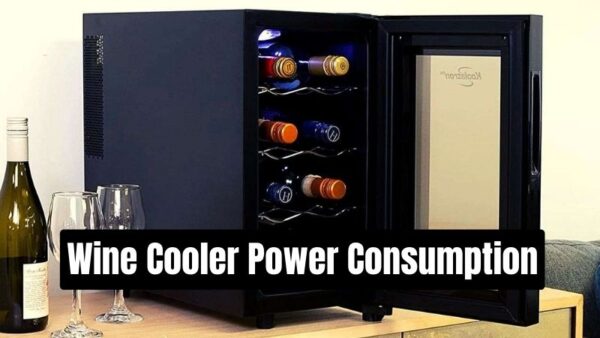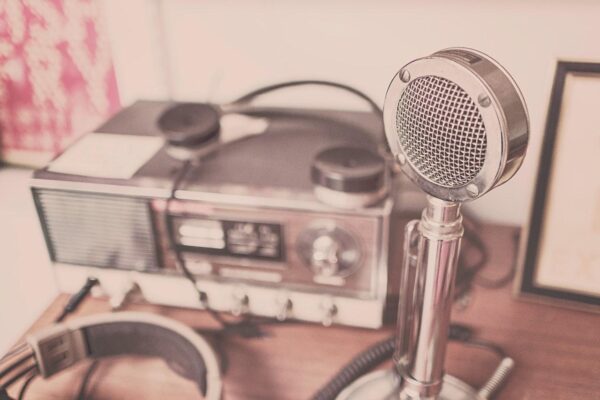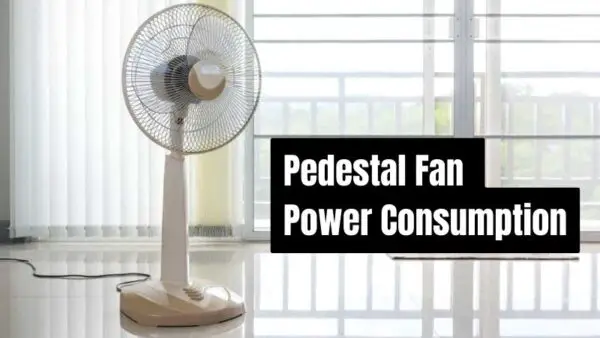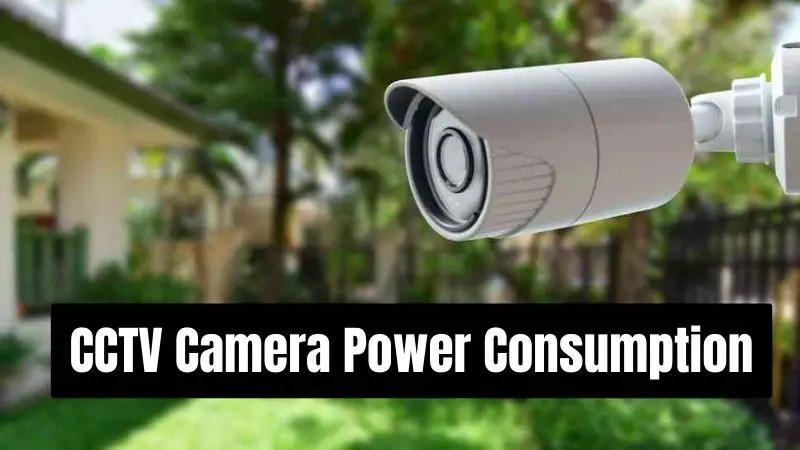
If you are planning to buy a new CCTV camera system or wondering how much electricity your existing CCTV camera is consuming then this article is for you. In this article, we will calculate the power consumption of a CCTV camera system and also look at how much it costs to use one.
CCTV cameras are normally rated between 2 watts to 10 watts. A 5 watt CCTV camea running for 24 hours in a day will consume around 3.6 kWh of electricity in a month. This adds up to around 43.8 kWh of electricity in a year.
This would roughly translate to a annual electricity cost of $ 7.09 in the US, £ 15.76 in the UK, C$ 6.83 in Canada, and Rs 438 in Mumbai, India.
CCTV Camera Power Consumption Calculator:
The power consumption of a CCTV camera (for that matter any electrical appliance) depends upon two main things,
- First is the wattage of your CCTV cameras,
- And second is the electricity tariff in your area.
Before we jump into calculating the power consumption of your CCTV camera let’s see what these terms are and how you can find out your CCTV camera’s wattage and the electricity tariff of your locality.
If you already know these terms and just want to use the calculator then please scroll down to use the calculator.
What is The Wattage Of A CCTV Camera And How To Find It:
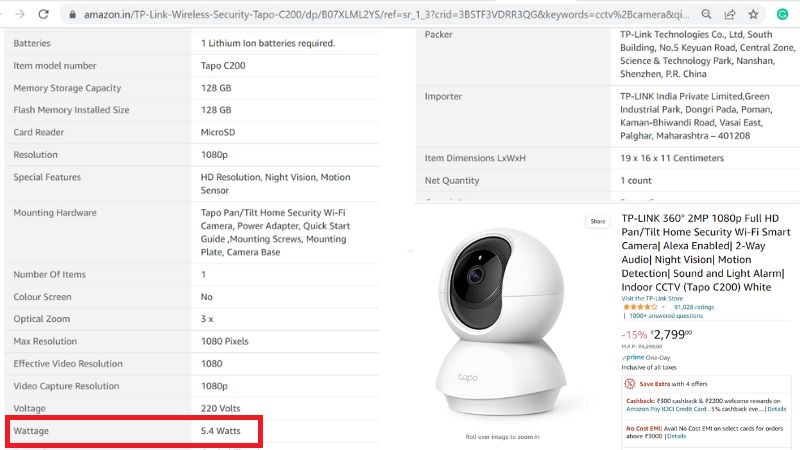
The rated power (wattage) of most CCTV cameras varies from 2 watts to 15 watts.
The power consumption of security cameras with special features like IR illumination night vision and pan-tilt will be more than conventional CCTV / IP security cameras without these functions.
On average, you can expect a bump of 2 watts to 4 watts for these special features.
Along with your camera, you might use a DVR/NVR depending on your requirement. The wattage of a DVR/NVR is between 10 watts to 50 watts.
You can find the wattage of your CCTV camera on its box or on the camera itself. If you don’t find wattage over there then you might see something like this: 12 VDC/500mA.
Just multiply the voltage (V) by the current (I) and you will get the rated power (wattage).
In this case, Power = Voltage (V) X Current (I) = 12 X 0.5 = 6 Watt.
If you don’t see any of this information on your CCTV box or on the camera itself, then head over to amazon or the camera manufacturer’s website and find your CCTV camera or similar model CCTV over there and check it’s wattage in the product description.
In a similar way, you can find the wattage of your DVR/NVR if you are using it.
If you want to know the wattage of different CCTV camera models and DVRs then check out this document from Hikvision PDF.
If you don’t want to do any of this, then use the below-mentioned figures for the calculation:
- CCTV camera rated power- 5 watts.
- DVR/NVR rated power – 10 watts (for a small house).
- DVR/NVR rated power – 40 watts (for building, society, offices).
If you don’t know what a watt is then here is a quick explanation,
Watt is the unit of power. It means the rate at which electricity is consumed or produced by a device. For example, a 50-watt TV consumes power at a rate of 50 watts per hour, it does not mean that the TV consumed 50 units of electricity, it means it will consume power at a rate of 50 watts every hour.
So in short, the wattage of a CCTV camera lies between 2 watts to 15 watts and you can find it by looking at the label on it. With that out of the way, let’s look at what is electricity tariff.
What is your Electricity Tariff:
In simple words, electricity tariff is the amount your electricity provider charges you for one unit (kWh) of electricity. I live in Mumbai, India here the electricity tariff is Rs 12/kWh.
(What is a Kilowatt hour (kWh) – Kilowatt hours or units of electricity is the energy consumption of a device. For example, a 50-watt table fan running for 50 hours will consume 50 watts x 50 hours = 2500-watt hours = 2.5-kilowatt hours of electricity = 2.5 units of electricity. (1 kWh of electricity = 1 unit of electricity))
To find your electricity tariff, just look into your previous month’s electricity bill and find out your monthly electricity consumption, then just divide your monthly electricity consumption by your total monthly electricity bill, the figure you get is approximately your electricity tariff.
I have put together the following table that shows the electricity tariff of a few countries.
Electricity Tariff Around The World:
| Country | Electricity Tariff | Country | Electricity Tariff |
|---|---|---|---|
| United States | $ 0.154/kWh | India | Rs 6/kWh |
| United Kingdom | £ 0.27/kWh | Germany | € 0.44/kWh |
| Canada | C$ 0.30/kWh | Philippines | ₱ 9.70/kWh |
| Australia | A$ 0.32/kWh | South Africa | R 2.558/kWh |
You can also check out the following resources to know your electricity tariff:
- https://www.globalpetrolprices.com/electricity_prices/
- https://www.statista.com/statistics/263492/electricity-prices-in-selected-countries/
Calculate CCTV Camera Power Consumption:
With these two pieces of information in hand, you are ready to find the power consumption of your CCTV camera system.
Let me show you an example,

I have selected a 5.4 Watts CCTV camera listed on amazon.
Let’s assume we have 4 such cameras and we keep them running 24 X 7 for the entire year. Also, we have a 20-watt DVR.
Hence, we will calculate the daily, monthly, and annual power consumption of this CCTV camera system.
With the knowledge of your CCTV camera wattage and your electricity tariff, just use this simple formula to calculate power consumption.
Power consumption of an appliance = Wattage of the appliance X operational hours
Cost to run an appliance = Power consumption of the appliance X electricity tariff
(Operational hours is basically the number of hours you are using your CCTV camera)
Now let’s calculate,
How Much Power Does A CCTV Camera Consume:
In our case, as we have 4 cameras (5 watts each) and a 20-watt DVR, the total wattage is 40 watts and operational hours are 24 hours a day, 720 hours a month, and 8,760 hours a year.
Hence by using the above formula,
- Daily power consumption of our CCTV camera system (24 hours) = 40 watts X 4 hours = 0.16 kWh
- Similarly, Monthly power consumption of our CCTV camera system (24 hours/day @ 30days) = 40 watts X 720 = 4.8 kWh
- And annual power consumption of our CCTV camera system (24 hours/day @ 365 days) = 40 watts X 8760 = 58.4 kWh
Now that we know the power consumption just multiply it by your electricity tariff and you will get how much it will cost you to run your CCTV cameras.
For our example, I have calculated the cost to run this 4-camera CCTV setup for 24 hours every day for an entire month in USA, UK, and Canada.
- In the US, the avg. electricity tariff is around 16.20 cents per kWh, hence it will cost around $ 0.78 (4.8 kWh X 16.20 cents) to run this CCTV camera system for 24 hours every day for an entire month in the US.
- In the UK, the avg. electricity tariff is around 36 pence per kWh, hence it will cost around £ 1.72 (4.8 kWh X 36p/kWh) to run this CCTV camera system for 24 hours every day for an entire month in the UK.
- In Canada, the avg. electricity tariff is around C$ 0.156 per kWh, hence it will cost around C$ 0.75 (4.8 kWh X C$ 0.156/kWh) to run this CCTV camera system for 24 hours every day for an entire month in Canada.
- In Mumbai, India, the avg. electricity tariff is around Rs 10 per kWh, hence it will cost around Rs 48 (4.8 kWh X Rs 10/kWh) to run this CCTV camera system for 24 hours every day for an entire month in Mumbai, India.
How Much Does it Cost To Run A CCTV Camera System:
For your reference, I have calculated the cost to run this 4-camera CCTV setup (5 watts each + 20 watts DVR) for 24 hours daily throughout the entire year in the US, the UK, India, and Canada.
| Country (Tariff) | Daily Power Consumption of 4 Nos. 5W CCTV Camera | Monthly Power Consumption of 4 Nos. 5W CCTV Camera |
|---|---|---|
| USA (16.20 c/kWh) | 0.16 kWh, $ 0.15 | 4.8 kWh, $ 2.06 |
| UK (36p/kWh) | 0.16 kWh, £ 0.22 | 4.8 kWh, £ 6.48 |
| Mumbai, India (Rs 10/kWh) | 0.16 kWh, Rs 1.6 | 4.8 kWh, Rs 48 |
| Canada (C$ 0.156/kWh) | 0.16 kWh, C$ 0.094 | 4.8 kWh, C$ 2.80 |
If your country is not on the table, then just note down the power consumption and multiply your electricity tariff to get the running cost.
The above figures show the approximate power consumption of a 4-camera CCTV setup along with a DVR, however, the actual power consumption can be 10 % – 20 % on either side.
Now go ahead and use the below calculator to find out the power consumption of your CCTV camera setup.
Just type the total wattage of your camera (along with DVR if applicable), hours of usage (24 in most cases), and your electricity tariff, and let the calculator do the math for you.
CCTV Power Consumption Calculator:
The above-calculated values show an approximate power consumption of the CCTV security system.
If you are not happy with the approximate results and you want to know the exact power consumption, then I would suggest you buy a cheap Kill-A-Watt Meter from amazon.
Calculate the exact power consumption of any Camera using Kill A Watt Meter:
Kill A Watt Meter is a simple device that gives real-time data on the power consumption of any device.
You can check it on amazon using this link – Kill A Watt Electricity Usage Monitor
To use a kill-a-watt meter to calculate the power consumption of your CCTV camera system, first, connect one of your CCTV cameras plug into the kill-a-watt meter, and then plug the kill-a-watt meter in your wall socket and you are good to go.
Then let the camera run and you can see in real-time how many kWh (units) of electricity it is consuming.
Just calculate the daily power consumption of one camera and multiply that by the number of cameras you have installed.
This way you will get a pretty accurate estimate of the daily power consumption of your entire CCTV camera setup.
If you want to know more about CCTV camera power consumption then check out this article.
If you like this article then please share it on WhatsApp, Facebook, Pinterest, and Reddit.
If you have any suggestions or any doubts then please leave them in the comments below.
Check out the following articles to know the power consumption of other appliances:
- Power consumption of infrared heaters.
- Power consumption of an electric blanket.
- Power consumption of an electric kettle.
- Power consumption of an electric fireplace.
- Power consumption of an electric water heater.
- Power consumption of an electric immersion heater.
- Power consumption of a refrigerator.
- Power consumption of a dehumidifier.
- Power consumption of a washing machine.
You can check out this article to know more about the power consumption of common household appliances.
Check out my articles on solar power for home and how it can help you save your electricity bill.
Thank you for reading.
Aavjo 👋
Reference:
- https://ipvm.com/reports/ip-camera-power-use-rankings
- https://reolink.com/cctv-ip-security-camera-power-consumption/
- https://www.reddit.com/r/homedefense/comments/5kyx2q/home_defense_and_electric_bills/
- https://www.hikvision.com/upload/20151217225729419.pdf



